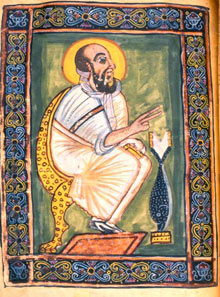British specialists help save Ethiopia’s ancient Garima Gospels
Garima Gospels, possibly among earliest surviving illustrated Christian manuscripts, preserved by Anglo-French team working at remote monastery.
Legend has it they were created in a day after God intervened to delay the sunset. Today, a British charity revealed how it had worked to save the Garima Gospels and set out evidence suggesting they may form one of the earliest surviving illustrated Christian manuscripts.
Kept at the remote monastery of Abuna Garima in northern Ethiopia, the two volumes had become fragile. But an Anglo-French team of specialists sponsored by the Ethiopian Heritage Fund travelled there to preserve them.
The gospels are named after Abba Garima, a monk who arrived in Ethiopia in the fifth century. The story goes that, with God’s assistance, he copied the four gospels in a day. In the 1960s specialists studied them and concluded they were created around 1100. Later, however, a French specialist in Ethiopian art took two fragments to Oxford and one was dated to the fifth century.
But the gospels were in poor condition. An Anglo-French team was put together, including Gloucestershire bookbinder and manuscript conservator Lester Capon, who described how his breath was taken away when he saw the “beautifully bright colours” of the illuminated pages. “I’d seen photos when I was preparing for this work, but seeing this book in real life was astonishing. It was big – you could fell an ox with it – it was beautiful, the colours were vibrant. But the condition was poor. It had the look of a burst mattress.”
He set up his “bindery” in the monastery courtyard, which attracted the attention of monkeys. “I kept an eye on them as I was fearful that one may jump down from the roof, grab a folio, scrunch it up and run off down the hill.”
The team only had time to conserve the illuminated pages. Blair Priday, of the London-based Ethiopian Heritage Fund, said the story of the gospels was “magical”, with nobody knowing where fact and fiction met.
Photo: BNPS.co.uk

